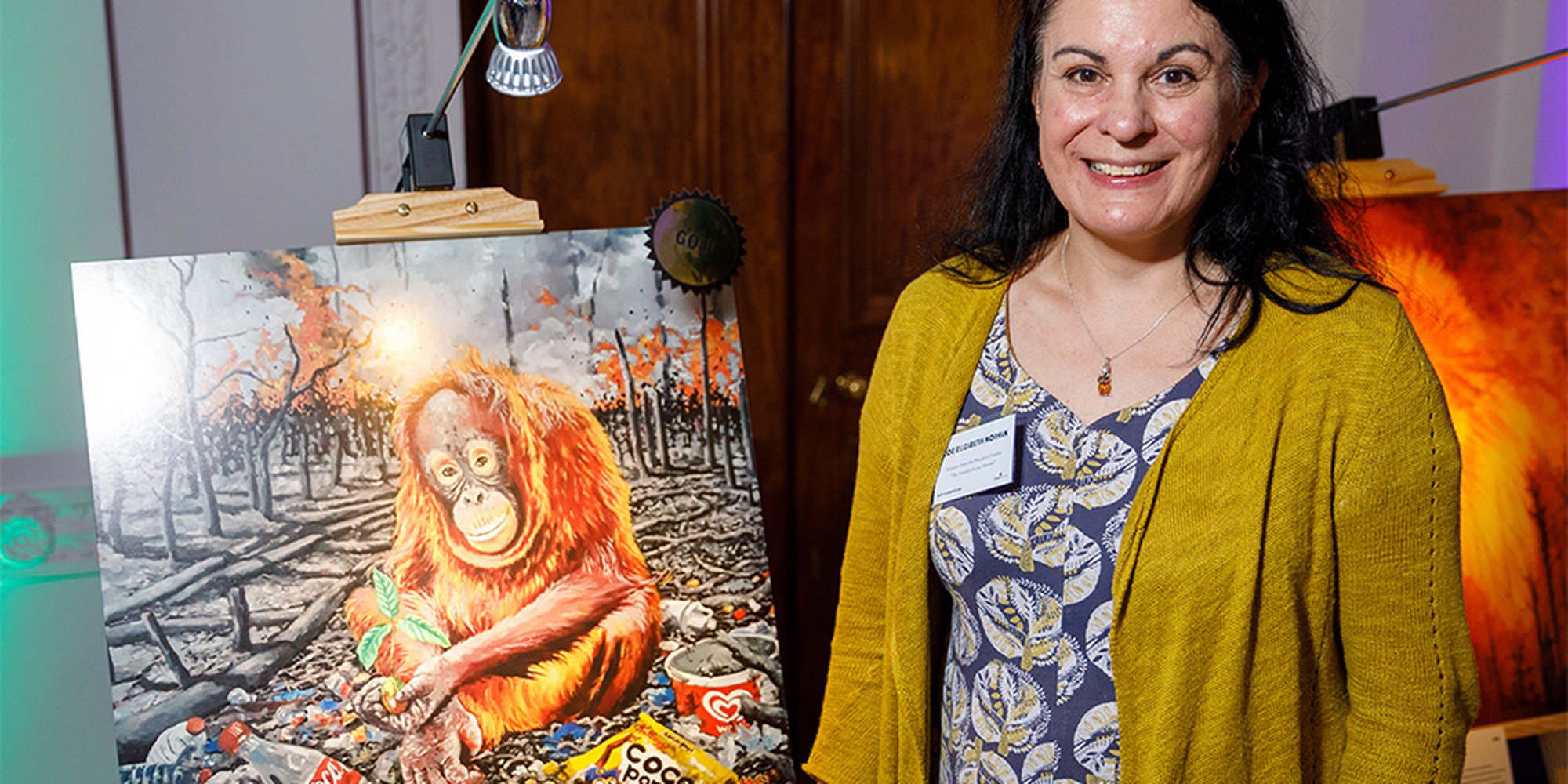Zoe Elizabeth Norman, UK-based landscape painter, won first prize in Portraits from the Precipice, our climate change energy prize with Octopus Energy.
Zoe's passion and advocacy for wildlife and the climate change crisis inspired her to create her piece, 'The Future is in Our Hands!' in just one week. We're glad she did, because her artwork was chosen out of more than 500 entries to win a huge £10,000.
Here, we catch-up with Zoe to understand the ingenuity behind her art and why supporting measures to combat climate change is so important.
How old are you?
I am 51 years old and live in Norfolk, not too far from the beautiful cathedral city of Norwich.
What inspired you to get involved in Portraits from the Precipice?
I nearly didn't enter the competition because I had just agreed to undertake two very large commissions, but 'Portraits From The Precipice' inspired me so much that I was determined to do a painting especially for it. I had just changed jobs, so I took a couple of weeks leave to devote myself to the project. I am a keen petitioner for the environment and wildlife, and regularly get involved with petitions organised by Avaaz, Change.Org, Friends of the Earth and Greenpeace, so was already very aware of today's environmental issues and loved the opportunity this project offered to paint something with meaning and impact for a cause I really believe in.
I decided the plight of our rainforests was of the most importance to me and if I could bring awareness to other people of the devastation being caused by our consumption of palm oil, this could only be a good thing and might even make a difference. I have banned palm oil from my own shopping trolley and it has been very difficult. Nearly every biscuit and chocolate bar now contains palm oil!
I decided on my composition which has a young orangutan central to the painting with the burning rainforest behind her. Orangutans represent all that is good in this world - they are gentle and wise and live in harmony with their surroundings, a better version of ourselves maybe!
Dudley Zoo were more than happy to let me use their orangutan, Sprout, as the reference for my painting. She was holding the perfect pose; she had just lost a tooth and was proudly but solemnly holding it out to show. I decided this was the image I wanted. My orangutan is holding an Ironwood seedling, which is one of the largest and most ancient trees, vitally important to the rainforest ecosystem. The rubbish around my orangutan symbolises the other great environmental catastrophes of our time, but also names and shames the worst culprits of rainforest destruction for palm oil. The doll's head was inspired by the terminator films and is a chilly precursor of Armageddon.
How and when did you first become an artist?
I have always loved drawing since I could first hold a pencil, however I didn't really get inspired to take my art seriously until I left full-time employment to start a family. We moved to the countryside and bought a tiny, run down old cottage with an overgrown weedy garden. I was six months pregnant but inspired by the late Geoff Hamilton to have a cottage garden. So my husband renovated the cottage and I planted flowers. This garden and the beautiful surrounding countryside was my inspiration to paint. I started by bringing in bunches of flowers and arranging compositions with china and other bits and pieces. These paintings led me on to having a 20-year career illustrating greeting cards, which I juggled with bringing up my three daughters.
What does art mean to you?
Art to me is the best form of meditation and while I am painting I am truly at peace. Art means everything to me and without it I would not be a whole person.
Do you have any other employment, and how does art feed into this?
I work three days a week for the NHS in recruitment. My job is very demanding and tiring so I really can’t mix it with my art, however I then have three days to paint and I start work in my studio at 8am and continue until 5pm. I like to have a quiet day on Sundays relaxing with my family.
What will you do with the prize money?
I have always wanted to go to India, Japan, Italy and Africa and visit some beautiful wild places to paint. I also have a dream to one day travel all the way around the coastline of the British Isles. painting as I go.
What are some of your favourite materials to work with and why?
I started with watercolours which I used exclusively for many years. I painted in a very detailed style building up rich colour and texture through many glazes. This form of painting however is very time consuming and a few years ago I started experimenting with different mediums and discovered oils. I now paint nearly exclusively in oil paints on stretched canvas and love how free and expressive I can be. My paintings are also getting larger and I love painting the landscape. I don’t like the smell of turps so my favourite oil paints are Georgian water mixable oils.
What do you say to those who think the art world is only for the rich?
We are all very influenced by art which we see everywhere, from patterns on curtains to images on book covers. I think people see buying paintings as an extravagance since people don’t need art like they do clothes or furniture. However, as a gift or for a special occasion art will always have a place for everybody, and art can be very affordable from local art exhibitions and online galleries.
How can art help raise awareness of the climate crisis?
Art is very visual and can definitely be used as a tool to bring awareness to the climate crisis that our planet is facing. Most people want to do the right thing, they just need direction and guidance to know what that is. Our governments also need to bring in legislation quickly, because giant corporations only care about making money and they won’t change unless they are forced to.


